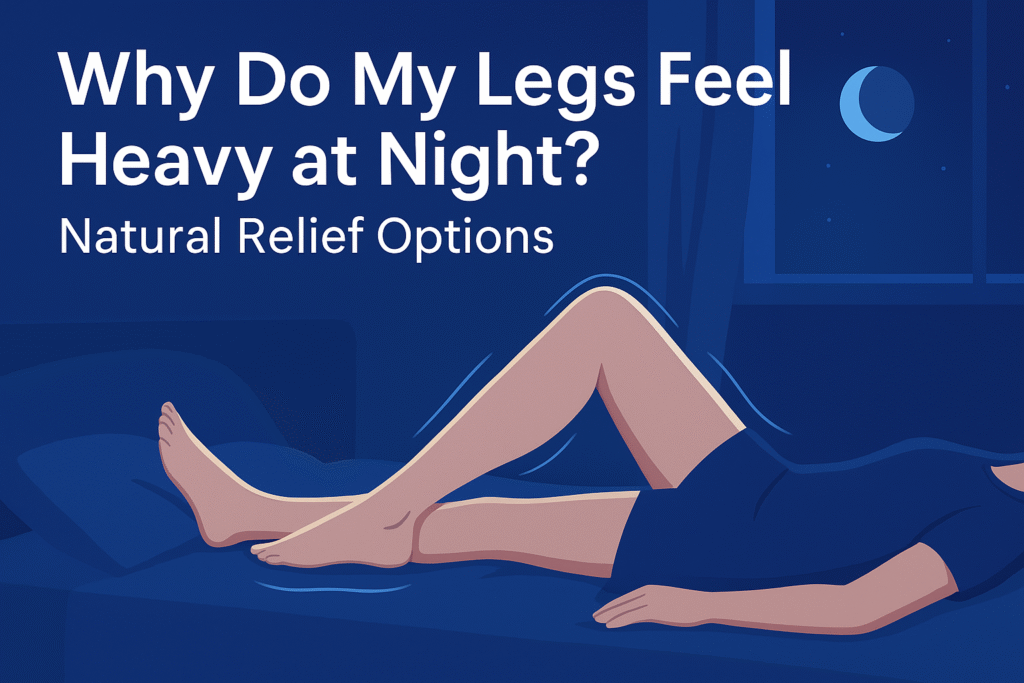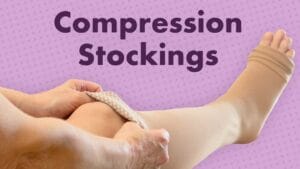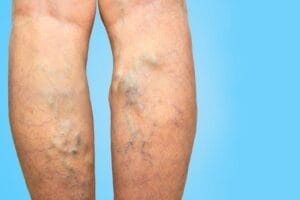
⚠️ Affiliate Disclaimer: This post may contain affiliate links, which means I may earn a small commission — at no extra cost to you — if you make a purchase through one of these links. I only recommend products or services I genuinely trust and believe can provide value. Thank you for supporting My Medical Muse!
Why Do My Legs Feel Heavy at Night? 10 Powerful Natural Relief Options
Why Do My Legs Feel Heavy at Night? Natural Relief Options
Many people struggle with a peculiar yet bothersome sensation, their legs feel heavy, achy, or weighed down at night. While it may seem like a minor discomfort, heavy legs can disrupt your sleep, reduce mobility, and sometimes signal an underlying health issue.
If you often find yourself asking, “Why do my legs feel heavy at night?” you’re not alone. This article explores the common causes, risk factors, and natural relief options that can help restore comfort and improve circulation.
Understanding the Sensation of Heavy Legs
Leg heaviness isn’t a medical diagnosis but rather a descriptive symptom that can feel different for each person. It often presents as:
- A dragging or weighted-down feeling even without intense activity
- Achiness, throbbing, or dull pain, especially after long periods of standing
- Stiffness that makes it harder to move your legs freely
- Restlessness or tingling, sometimes paired with swelling.
This discomfort tends to intensify at night because circulation naturally slows down when the body is at rest. Throughout the day, gravity also encourages fluid to collect in the lower limbs, especially if you’ve been standing or sitting for long stretches, by evening, this accumulation can make your legs feel heavy, swollen, and tired.
Common Causes of Heavy Legs at Night
There are many possible reasons why your legs feel heavy at night. Some are temporary and lifestyle-related, while others may point to an underlying condition that needs medical attention.
1. Poor Circulation (Venous Insufficiency)
One of the most frequent culprits is chronic venous insufficiency (CVI). In healthy veins, tiny valves help push blood back toward the heart. When these valves weaken, blood can pool in the lower legs. This leads to:
- Persistent swelling around the ankles
- A sensation of heaviness or pressure, worse in the evening
- Visible skin changes over time, such as discoloration or dryness.
CVI is more common in people who stand for long periods, are overweight, or have a family history of vein problems.
2. Varicose Veins
Closely related to venous insufficiency, varicose veins are enlarged, twisted veins that often appear bluish or purple. They don’t just affect appearance, they can cause:
- Heaviness and throbbing after a long day
- Burning or itching sensations
- Swelling that makes shoes feel tight at night
Although varicose veins are not always dangerous, they can worsen over time and lead to complications like ulcers if left untreated.
3. Fluid Retention (Edema)
Another common cause is edema, which happens when excess fluid builds up in the tissues. This can occur due to:
- Standing or sitting for too long
- A high-salt diet that encourages fluid retention
- Medical conditions such as heart disease, kidney problems, or liver issues
- Hormonal fluctuations, especially in women
Edema often causes puffiness around the ankles and calves, making the legs feel heavy and stiff.
4. Muscle Fatigue
Sometimes, heavy legs are simply the result of tired muscles. If you’ve walked long distances, exercised intensely, or stood on your feet all day, your muscles may accumulate lactic acid and feel weighed down. This type of heaviness usually improves with rest, stretching, and hydration.
5. Restless Legs Syndrome (RLS)
Restless Legs Syndrome is a neurological condition that creates uncomfortable sensations in the legs, particularly at night. While most people describe it as tingling, crawling, or an urge to move, some also experience a sense of heaviness or pressure. RLS can significantly disrupt sleep quality and is often linked to iron deficiency or nervous system imbalances.
6. Peripheral Artery Disease (PAD)
In Peripheral Artery Disease, narrowed arteries reduce blood flow to the legs. Unlike venous issues where blood pools, PAD limits the blood reaching your muscles.
Symptoms include:
- Heaviness or cramping when walking (claudication)
- Weakness and fatigue in the legs
- Discomfort that lingers into the evening or night
PAD is a serious condition linked to cardiovascular disease and requires medical evaluation.
7. Hormonal Changes
Hormones influence circulation, fluid balance, and vein elasticity. Women often notice heavy legs during:
- Menstruation, due to fluid retention
- Pregnancy, as the growing uterus presses on veins and increases blood volume
- Menopause, when falling estrogen levels affect vein strength and circulation
These shifts can make legs feel achy, swollen, and heavy, particularly in the evening.
8. Obesity and Sedentary Lifestyle
Excess body weight increases pressure on leg veins, while long periods of inactivity, like sitting at a desk or lounging without movement reduce circulation efficiency. Together, these factors raise the likelihood of experiencing heavy legs at night.
9. Medications
Some prescription drugs have side effects that contribute to fluid buildup or circulatory changes. Common examples include:
- Calcium channel blockers (for high blood pressure)
- Steroids (for inflammation)
- Antidepressants
- Hormone therapies, such as birth control pills
If you’ve noticed heavy legs after starting a new medication, it’s worth discussing with your healthcare provider.
Risk Factors That Make Heavy Legs Worse
While heavy legs can affect anyone, certain habits, conditions, and environmental factors can make the problem worse. Recognizing these risk factors can help you take proactive steps to prevent or minimize discomfort.
1. Standing or Sitting for Long Periods
When you remain in one position too long, whether standing behind a counter or sitting at a desk blood flow slows, and fluid begins to pool in your legs. Over time, this puts extra pressure on your veins, increasing the sensation of heaviness.
2. Hot Weather
Heat causes blood vessels to dilate, which reduces vein efficiency and promotes swelling. That’s why many people notice heavier, swollen legs during summer months or after spending time in saunas and hot tubs.
3. High-Salt Diet
Excess sodium in the diet contributes to water retention, which makes legs feel stiff, swollen, and heavy. A salty meal may not matter once in a while, but consistently high intake increases the risk of edema.
4. Lack of Exercise
A sedentary lifestyle weakens muscles that help pump blood back toward the heart. Without regular movement, circulation slows, and the likelihood of leg heaviness rises, especially in the evenings.
5. Tight Clothing
Tight jeans, socks, or undergarments may restrict circulation and lymphatic flow in the legs. While fashion-forward, these items can worsen heaviness if worn frequently.
6. Smoking
Smoking damages blood vessels, reduces oxygen supply, and increases the risk of vascular disease. Over time, this can make symptoms like heaviness, pain, or swelling much worse.
Natural Relief Options for Heavy Legs at Night
The good news? You don’t always need medication to manage heavy legs. Many natural remedies and lifestyle adjustments can ease symptoms, support healthy circulation, and restore comfort.
1. Elevate Your Legs
One of the simplest and most effective remedies is leg elevation. By raising your legs above the level of your heart, you help fluids and blood drain back toward the upper body, reducing swelling and heaviness.
How to try it:
- Place a few pillows under your legs while lying on your back.
- Practice yoga’s legs up the wall pose for 5-10 minutes before bedtime.
2. Gentle Exercise
Movement encourages circulation and strengthens muscles that assist venous return. Even light activity can make a noticeable difference.
Beneficial options include:
- Walking or light jogging in the evening
- Cycling outdoors or on a stationary bike
- Swimming, which reduces pressure on joints while improving circulation
- Gentle yoga poses or stretching before sleep
3. Massage and Self-Massage
Massage stimulates blood flow, relaxes tense muscles, and promotes lymphatic drainage. You can book professional lymphatic drainage massages or try self-massage at home.
Tips:
- Use upward strokes moving from ankles toward thighs.
- Apply natural oils such as olive, coconut, or almond oil.
- Add a few drops of essential oils like peppermint (cooling effect) or lavender (relaxing).
- Foam rolling can also help release tight muscles in the calves and thighs.
4. Compression Therapy

Wearing compression stockings or socks during the day supports vein function, reduces swelling, and prevents fluid buildup. They work by applying gentle pressure to the legs, helping veins push blood upward.
Choose medical-grade compression socks if recommended by your doctor. These are especially helpful if you stand or sit for long periods.
5. Cold Water Therapy
Cool water helps constrict dilated veins and reduce inflammation. Many people find relief by:
- Rinsing their legs with cold water before bed
- Applying cold compresses to swollen areas
- Alternating between warm and cool water in the shower to stimulate circulation
6. Stay Hydrated
Dehydration thickens the blood and makes circulation less efficient. Drinking enough water throughout the day helps flush out excess sodium and prevents fluid buildup in tissues. Aim for at least 6-8 glasses daily, adjusting for activity level and climate.
7. Herbal Remedies
Certain herbs are known for their circulation-boosting and vein-supporting properties:
- Horse Chestnut Extract: May strengthen vein walls, reduce swelling, and improve venous return.
- Gotu Kola: Supports vein tone and capillary health, often used in traditional medicine.
- Ginkgo Biloba: Improves blood flow and reduces heaviness, especially in people with circulation issues.
Always consult a healthcare professional before starting supplements, as they may interact with medications.
8. Dietary Changes
What you eat plays a big role in vascular and muscle health.
- Eat more flavonoid-rich foods: Berries, citrus fruits, spinach, and onions strengthen vein walls and improve circulation.
- Cut back on salt: Reducing sodium lowers water retention.
- Boost magnesium intake: Nuts, seeds, leafy greens, and dark chocolate can relax muscles and reduce cramps.
- Maintain a healthy weight: Even modest weight loss reduces pressure on veins and alleviates symptoms.
9. Proper Sleep Position
How you sleep can affect circulation.
- Sleeping on your back with legs slightly elevated is ideal
- Side sleepers can place a pillow between the knees to keep the spine and hips aligned, which also improves blood flow.
10. Mind-Body Techniques
Stress and poor sleep can intensify discomfort. Relaxation techniques may reduce muscle tension, lower stress hormones, and improve sleep quality.
Helpful options include:
- Deep breathing exercises
- Guided meditation before bed
- Progressive muscle relaxation (tensing and releasing muscle groups)
- Gentle evening yoga or stretching
When to See a Doctor
For many people, heavy legs at night are a temporary and manageable issue linked to lifestyle factors such as fatigue, fluid retention, or prolonged standing. However, in some cases, the sensation can be a warning sign of an underlying vascular or circulatory problem that needs prompt medical evaluation.
You should seek medical advice if you notice any of the following:
- Swelling that doesn’t go away: Persistent edema (fluid retention) may be a sign of vein disease, kidney problems, or even heart failure.
- Skin changes: Discoloration, dryness, thickening, or the appearance of ulcers could point to chronic venous insufficiency, which requires medical management.
- Severe pain or burning sensations: Sudden or one-sided pain in the legs can sometimes indicate a blood clot (deep vein thrombosis, or DVT) and should never be ignored.
- Worsening varicose veins: Large, twisted veins that continue to grow or cause discomfort may need professional treatment to prevent complications.
- Cold, pale, or numb legs: These symptoms may suggest poor arterial blood flow, often associated with Peripheral Artery Disease (PAD), a condition linked to higher cardiovascular risks.
If you experience any of these warning signs, it’s best to schedule a medical appointment promptly. Early diagnosis not only improves day-to-day comfort but also helps prevent complications such as blood clots, leg ulcers, or chronic circulation problems.
Lifestyle Habits to Prevent Heavy Legs
The best way to manage heavy legs is through prevention. By making small but consistent changes to your daily routine, you can reduce symptoms and protect your long-term vascular health.
Here are some practical lifestyle adjustments that make a difference:
- Take regular walking breaks: If your work keeps you seated for hours, stand up and stretch or take a short walk every 45-60 minutes. Small movements keep blood flowing and prevent fluid buildup.
- Avoid restrictive clothing: Tight jeans, socks with strong elastic bands, or narrow shoes can hinder blood circulation. Opt for breathable fabrics and comfortable footwear that allow better flow.
- Stay physically active: Aim for at least 150 minutes of moderate activity per week. Low-impact exercises like brisk walking, cycling, and swimming strengthen the calf muscles, which act as natural pumps to help blood return to the heart.
- Maintain a healthy weight: Excess body weight increases pressure on the veins in your legs, which worsens swelling and heaviness. Even modest weight loss can improve circulation.
- Limit alcohol and stop smoking: Alcohol encourages dehydration and fluid retention, while smoking directly damages blood vessels and raises your risk of varicose veins and PAD.
- Elevate your legs daily: Rest with your legs raised above heart level for 5-15 minutes, especially in the evening. This simple habit relieves pressure, reduces swelling, and gives your veins a much-needed break.
By practicing these circulation-friendly habits, you’ll not only ease current discomfort but also reduce the risk of long-term vein problems, keeping your legs healthier and lighter well into the future.
FAQs About Heavy Legs at Night
Can dehydration cause heavy legs?
Yes. When you’re dehydrated, your blood becomes thicker and circulates less efficiently. This can make it harder for oxygen and nutrients to reach your leg muscles, leading to fatigue, cramps, and a sensation of heaviness. Staying well-hydrated helps maintain optimal blood flow and prevents fluid retention that can worsen nighttime discomfort.
Do heavy legs always mean poor circulation?
Not always. Heavy legs can result from temporary issues such as muscle fatigue, hormonal changes, or standing for long periods. However, if heaviness persists, especially when accompanied by swelling, varicose veins, or skin changes, it may indicate an underlying circulatory issue like venous insufficiency or peripheral artery disease. In those cases, medical evaluation is recommended.
Is it normal for legs to feel heavy only at night?
Yes. Many people notice heaviness more in the evening because of how gravity and daily activity affect circulation. Throughout the day, fluids tend to pool in the lower legs, especially if you’ve been standing or sitting for long periods. At night, when you finally rest, you become more aware of these sensations.
Can heavy legs be reversed naturally?
In many cases, yes. Natural remedies and lifestyle adjustments such as elevating your legs, exercising regularly, improving hydration, reducing salt intake, and trying circulation-boosting herbs can greatly reduce symptoms. Improvement usually happens gradually, so consistency over weeks or months is key.
Should I wear compression socks while sleeping?
Typically, no. Compression stockings are designed to counteract gravity and support circulation during the day when you are upright. Wearing them overnight is usually unnecessary and may be uncomfortable. However, in certain medical conditions such as severe venous insufficiency or after specific surgeries, a doctor may recommend nighttime use. Always follow professional guidance.
Final Thoughts
Heavy legs at night are a common but often underestimated problem. For some, it’s simply a result of fatigue, long hours on their feet, or fluid retention. For others, it may signal underlying issues such as venous insufficiency or peripheral artery disease.
The good news is that many cases can be relieved naturally with lifestyle adjustments, simple home remedies, and preventive care. By staying active, maintaining a balanced diet, keeping hydrated, and practicing circulation-friendly habits like leg elevation or massage, you can significantly reduce the discomfort.
Still, it’s important not to ignore persistent or worsening symptoms. Professional evaluation ensures that serious conditions are detected early, giving you the best chance for effective treatment and long-term relief.
By taking proactive steps today, whether it’s a daily walk, healthier food choices, or mindfulness practices, you can keep your legs feeling light, energized, and pain free. A little care goes a long way in ensuring not just better sleep, but also improved circulation and overall well-being.
👩⚕️ Need Personalized Health Advice?
Get expert guidance tailored to your unique health concerns through MuseCare Consult. Our licensed doctors are here to help you understand your symptoms, medications, and lab results—confidentially and affordably.
👉 Book a MuseCare Consult NowRelated Blog Post You Might Like:
- Why Do I Keep Getting Canker Sores in My Mouth? 10 Powerful Fixes
- 7 Proven Fixes for Neck Stiffness After Sleeping Wrong
- Why Do I Jerk Awake Just as I’m Falling Asleep? 7 Powerful Facts You Must Know
- Why Do My Eyes Twitch Randomly? 12 Causes & Proven Everyday Fixes
- 15 Daily Habits That Quietly Kill Your Mental Health (And How to Stop Them)



